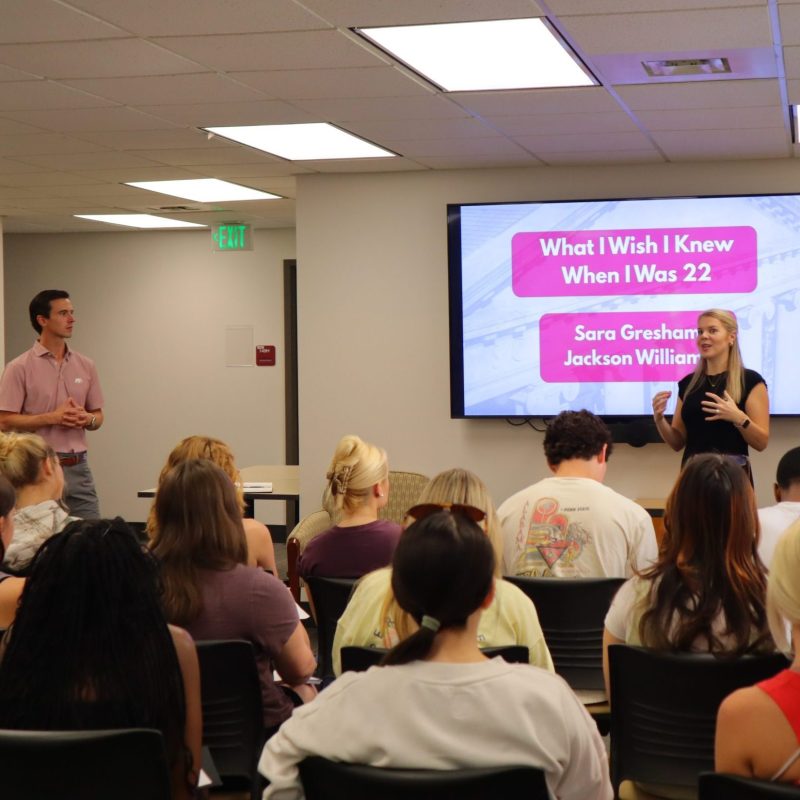Sara Gresham and Jackson Williams had an amazing experience at the Culverhouse College of Business. If they had a time machine, however, there are a few things they would do differently. They can’t do that, but they did share those ideas with Culverhouse students during a Leveraging Engagement to Advance Development (LEAD) lecture on Sept. 10, “What I Wish I Knew When I Was 22.”
Both work at Merrill Lynch today, but their journeys were anything but straightforward. For Gresham, a 2015 graduate with a finance degree and a master’s, wealth management runs in the family. Her father has led a financial advisory practice for more than four decades, and her two older brothers joined the business after college. Still, she was encouraged to chart her own path first. That led her to New York City, where she spent six years in Merrill’s corporate office, working across departments in a rotational program. She compared corporate roles to the behind-the-scenes staff of an Alabama football game: “You may not be the player on the field, but you’re still essential to making the whole thing work.”
The experience taught her what she liked, and what she didn’t. She shared with students that keeping an open mind is crucial. “I didn’t have a clue of what I wanted to do,” she said. “Doing things like internships really helps you kind of conceptualize that. Rotational programs were really impactful early in my career. You may learn you’re good at Excel, but you’d rather be talking with people. Or you may realize you like a remote manager, or that you really want someone in person.” Today, back in Atlanta and working on her family’s team, she focuses on strategy, growth, and making sure the business runs smoothly.
Williams’ path to Merrill Lynch was more unconventional. Growing up in Southlake, Texas, he majored in finance and economics, but along the way he tried nearly everything else: selling lacrosse gear in high school, manning a fireworks stand on the Nebraska-Iowa border, interning abroad in Barcelona, even teaching English in Thailand with his now-wife. Each stop, he said, was valuable—especially the ones that didn’t stick.
“I found out I hated accounting and had no interest in real estate,” Williams said. “But what a blessing to cross those off the list. If I had just sat around afraid to try, I never would have learned that.”
That process of elimination eventually led him to Merrill Lynch, where he now works as a financial advisor helping families map out everything from retirement plans to charitable giving. Unlike his earlier stints in corporate finance, this role allows him to interact directly with clients, which he calls the most rewarding part of the job. “It’s a people business first and foremost,” he said. “When my head hits the pillow, I know I’ve made a difference in someone’s life.”
Both acknowledged their careers look far different than they imagined at 22. But that’s really the point. “Don’t put too much pressure on yourself,” Gresham said. “Your first job won’t be your last job, and it doesn’t have to be your dream job.”
For Williams, the advice boiled down to trying, failing, and learning. “If you do nothing, you learn nothing,” he told students. “Failure isn’t the end. It’s how you figure out what’s right for you.”
Here are some tips and career advice Gresham and Williams — both members of the Culverhouse Board of Visitors — shared with Culverhouse students.
Be yourself—but be intentional
Williams warned against blindly mimicking coworkers or peers. Instead, pay attention to how people live and work, and ask yourself if that’s a path you want.
Navigate the office like a pro
Williams recommended literally drawing a map of the office and jotting down small personal details about coworkers so you can build relationships quickly and stand out.
Defy stereotypes
Older colleagues may expect Gen Z employees to be lazy or glued to their phones. Prove them wrong by showing initiative, working hard, and carrying yourself with confidence.
Ask for help the right way
Both encouraged students to reach out to senior leaders for advice, but do it respectfully. Schedule time, come prepared with questions, and follow up afterward to show you listened.
Use your free time with purpose
Whether it’s exercise, volunteering, or staying in touch with old friends, being intentional outside of work sets you apart personally and professionally.
Keep connections alive
Gresham shared her regret about losing touch with college friends and now makes a point to call people during her commute. A quick check-in, she said, can keep a relationship strong for years.
All about perspective
Perhaps the most reassuring advice came when both admitted they didn’t feel “purpose-filled” until years into their careers. Priorities change, dream jobs evolve, and the journey rarely looks like a straight line.

